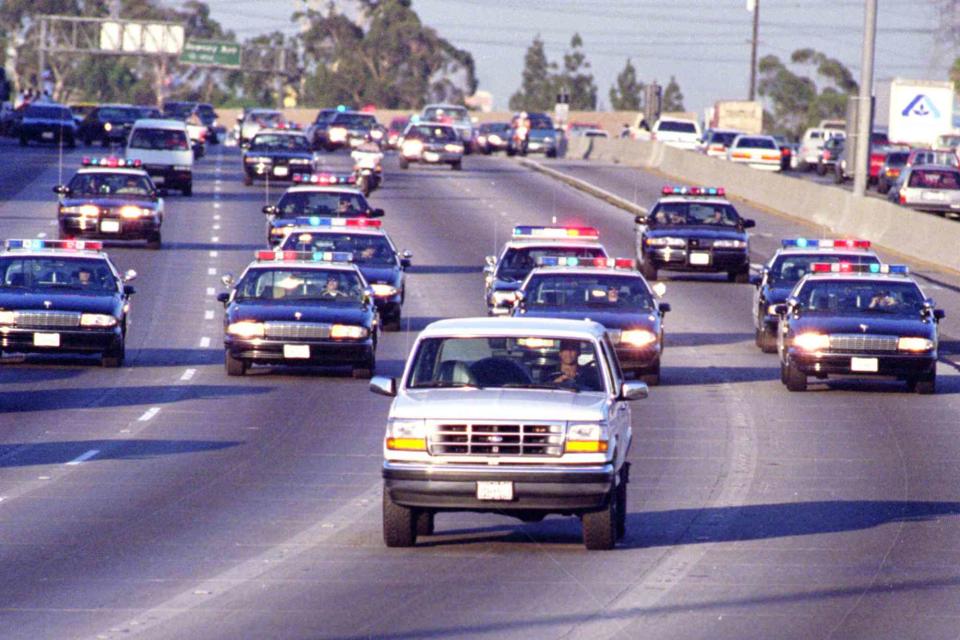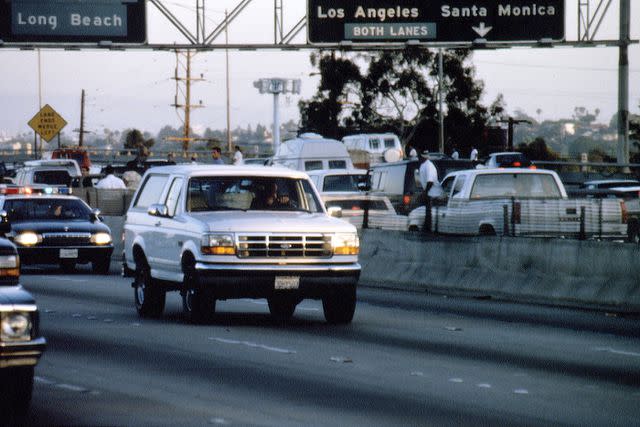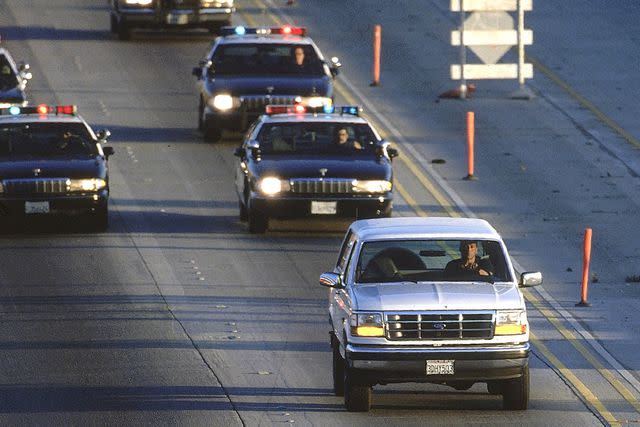O.J. Simpson Led Police on 2-Hour Chase of His White Bronco After Nicole Brown Simpson's Murder — Revisit the Shocking Ordeal
Simpson, who was ultimately acquitted in Nicole Brown Simpson's murder, evaded police while 95 million people watched on live television nearly 30 years ago

Allen J. Schaben/Los Angeles Times via Getty
O.J. Simpson and Al Cowlings in the '93 white Bronco during the chaseIn June, it will be 30 years since much of the nation — 95 million viewers, to be exact — was glued to their television screens, watching then-beloved football star-turned-actor O.J. Simpson evade police officers in a white Ford Bronco.
Simpson, who died at age 76 on April 10, was ordered to turn himself into police on June 17, 1994 following the murder of his ex-wife Nicole Brown Simpson. Simpson and her friend, waiter Ronald Goldman, were stabbed to death on June 12, 1994. Their bodies were found outside of her Los Angeles-area home in the early hours of June 13.
But Simpson did not follow orders, and while his whereabouts remained unknown well into the late afternoon on June 17, his attorney Robert Kardashian read a letter given to him by Simpson to the media. In part, Simpson's note said, "Thanks for making my life special. I hope I helped yours. Peace and love. O.J.”
That evening, though, after 6 p.m. local time, Simpson was spotted in a Bronco with close friend and teammate Al Cowlings, driving through Southern California on the interstate.

Ted Soqui/Sygma via Getty
O.J. Simpson's white Ford Bronco during the chase on June 17, 1994Cowlings was driving the vehicle, his own, and told police that Simpson was seated in the back with a gun pointed at his head. According to CBS, Cowlings called authorities from a cell phone, pleading, "You gotta tell the police to back off. He's still alive, but he's got a gun to his head." (Cowlings was arrested but ultimately charges were dropped for "aiding a fugitive.")
Related: The O.J. Nobody Knew — Read PEOPLE's July 4, 1994 Cover Story
Swarms of police vehicles began pursuing Simpson as the car traveled to the athlete's home in Brentwood, with the chase continuing for 60 miles at low speeds. News helicopters also quickly fell into pursuit of Simpson as traffic came to a standstill on much of the expressway with curious onlookers pulled over to watch.
Never miss a story — sign up for PEOPLE's free daily newsletter to stay up-to-date on the best of what PEOPLE has to offer, from celebrity news to compelling human interest stories.
"It was already the most televised police pursuit in history, but now it's so bizarre with people coming out," Orange County Sheriff's Deputy Larry Pool, who was the officer who originally spotted the 1993 Bronco, told NBC News in 2014. "There were people interfering with our pursuit. At one point, when we got into L.A., it was as though a concert had let out on the freeway. People were partying. I thought, if this was a movie, people would say that was a pretty good movie until that stupid car chase!"
The Bronco ultimately arrived at Simpson's L.A.-area home at 8 p.m., with police, and snipers, surrounding the house. Simpson eventually exited the vehicle — in which the LAPD found makeup adhesive, a fake mustache and goatee, Simpson’s passport and a gun — and surrendered to authorities.

Peter Read Miller/Sports Illustrated via Getty
The car chase in June 1994Ultimately, Simpson was charged with Brown Simpson and Goldman's murders, though he was acquitted in what was dubbed "The Trial of the Century." Following his acquittal, Simpson was sued in civil court by the Browns and Goldmans and found liable.
Simpson later wrote a controversial book If I Did It, in which he spoke about Brown Simpson and Goldman's killings. The Goldman family, who receive proceeds from the purchase of the book, view it as the late Simpson's confession of responsibility for the murders.
For more People news, make sure to sign up for our newsletter!
Read the original article on People.